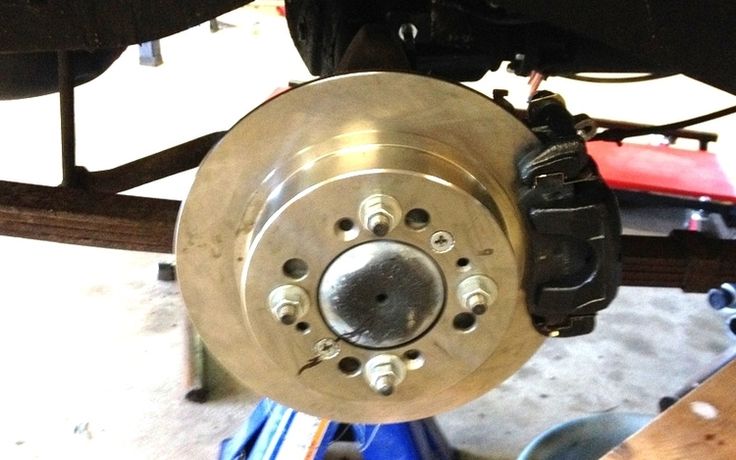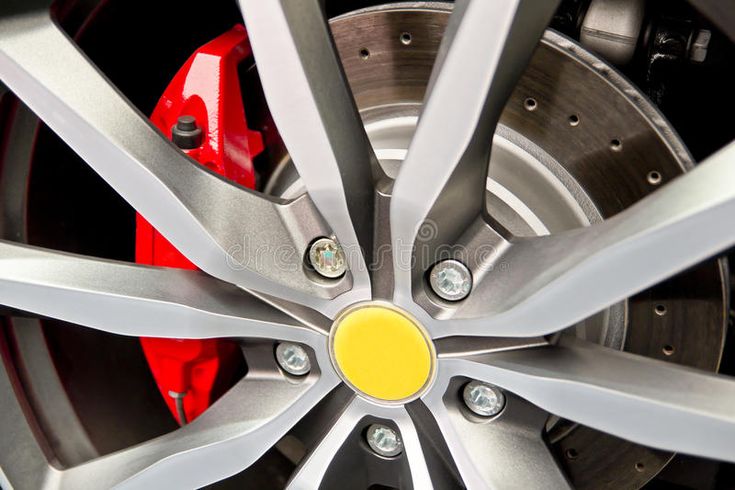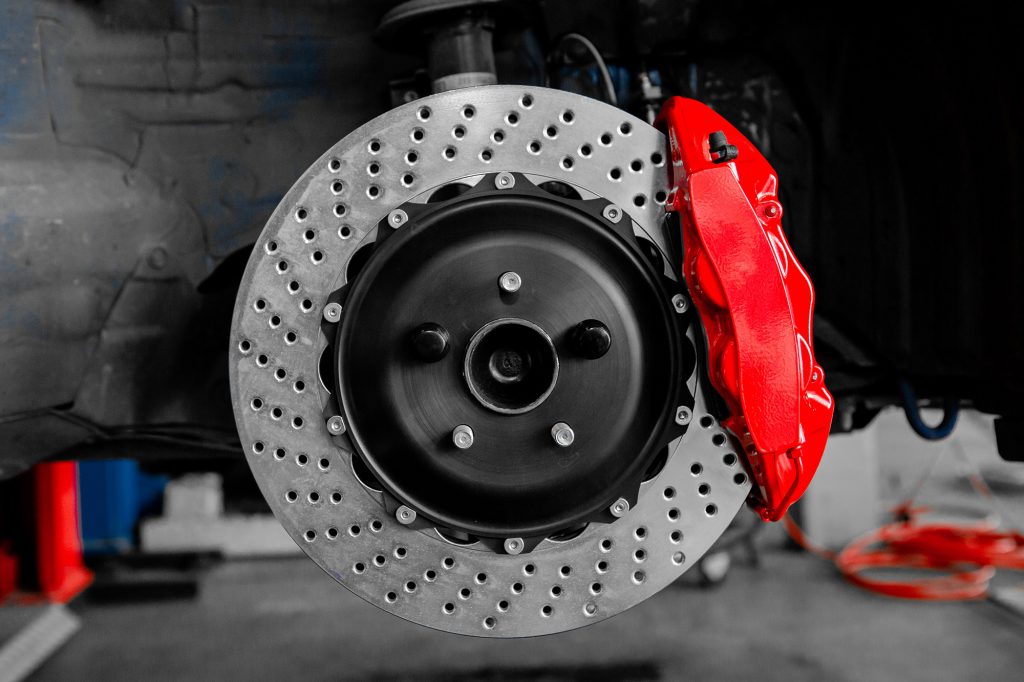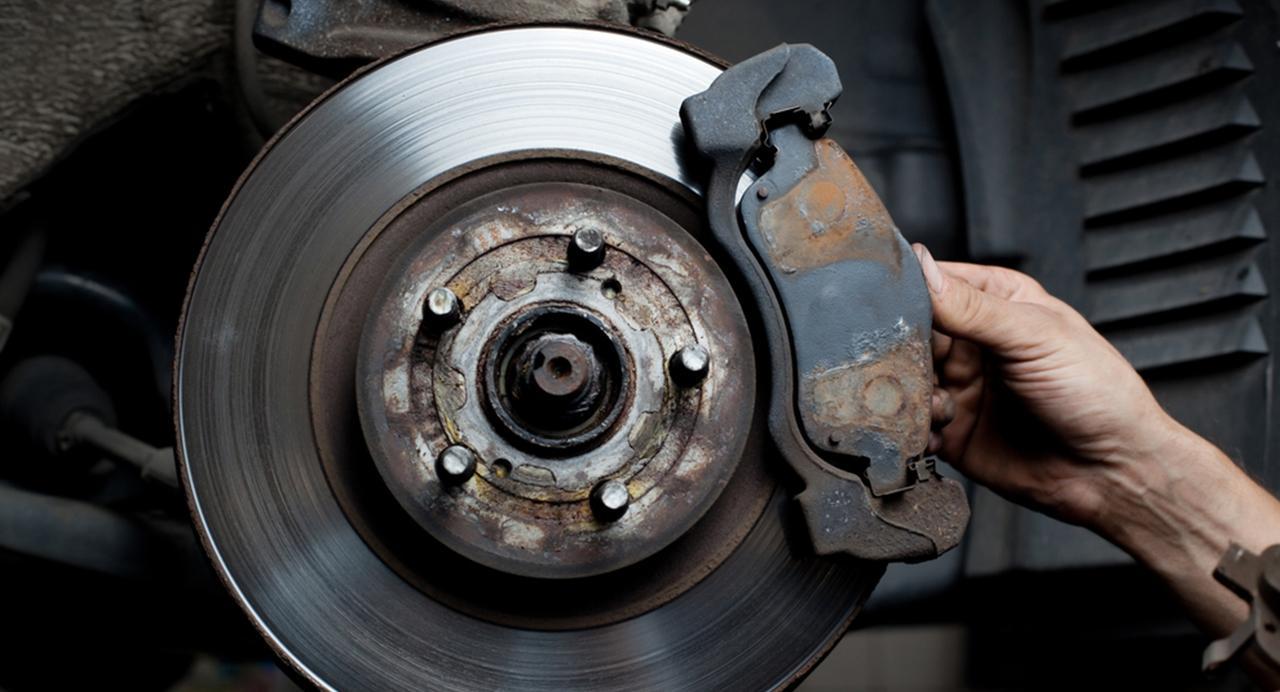When you notice a strange noise coming from the brake, the brakes are different in performance or have some burning smell from cars. At that point, stop the car and check the brake system problems immediately. Car braking is one of the things you need to do regularly and should not be overlooked. Parts of the brakes also have a certain life expectancy and they need periodic maintenance, sometimes replacements, to operate normally.
The brake is one of the most important safety components in your car. So, if you notice any of the common warning signs below regarding troubleshooting brake problems, be prepared to have certain solutions to repair or replace them.

Here are the signs that how to tell if brakes are bad and how to detect a problem while driving.
Contents
8 Warning Signs of Brake System Problems
1. Vibrating and squealing while braking
Feeling the brake pedal vibrating when the pedal is one of the common brake problems. Vibrations on the steering wheel is one of the brake problems, occur when you apply the brakes may be the result of rotors that are operating unevenly. Over time, along with thousands of turns of the wheel, the condition of the rotors with variable variations is normal. Corrosion can also develop over time as rotors operate. It can be seen, that during the maintenance of the brakes, the surface rotors are always plastered and flattened to minimize these variations. This maintenance should be done correctly and according to your vehicle’s specifications. Even in the smallest unit, rotors also play a safe role in driving, so pay close attention to this situation among the brake problems.
Another cause of this vibration among brake problems is that the caliper brake is not used properly. The use of caliper brakes is to keep the brakes on, preventing them from hitting the car’s rotors, and slowing down your car. This is the movement of the piston inside the brake caliper to create this connection. However due to wear from the heat or the impact of debris on the road, the piston may get stuck. And the signs of a bad brake caliper appear.
The subsequent cause of the shaking brake may be due to improper mounting of the wheel nut. This will make your brakes quick to malfunction. Lug nuts are considered to be large bolts that will tightly grip your tires and cause them to rotate in the normal orbit of the wheel.
2. Weird sounds in brake system
The wobble when braking is one of the warning signs of brake problems that your braking system has problems and needs to be cared for. However, the sound can be emitted from anywhere in the system, such as the hissing noise that can be caused by brake pads and rotor mismatched. This really needs to be repaired. The creaking sound comes when you brake, which is a sign that the brake pads have worn out, and should be replaced. This is a safety measure that the manufacturer makes among the brake systems.
If the noise is not loud or does not appear continuously, maybe dirt or rub has fallen into the brake mechanism. This will stop after the brake is cleaned. Some other causes include poor brake pads, incorrect brake pads, broken springs, and non-concentric brakes. Also, it may be that the noise from the brake pad sensor indicates that it needs to be replaced. Sometimes you can also hear the metal rubbing against one another, which can be caused by the wear of the brake pads. And every time you use the brakes, the two metal parts are fractioned together. When this happens you will have trouble braking, and it can damage the rotor.
3. Leaking fluid problems
Many may occur to your car. Too light brakes may result from wear of the brake pads or problems with hydraulic systems. This could come from such as leaks of brake fluid or air entering the oil reservoir. To check if there is a liquid leak, place an old piece of cloth or a piece of cardboard at the bottom of the car overnight. If liquid is found, they will lie on the cloth or cover. Don’t let the low brake fluid symptoms occur too often.
Cylinder is a tool that creates the power of your braking system. The cylinder consists of a wiper liquid and includes brake fluid. So let’s make sure that your car cylinders do not have brake problems and have any signs of low brake fluid. When you use the brake system, the liquid from the cylinder is pushed through the thin pipe, creating hydraulic pressure. If the fluid leaks from the system, there will be insufficient power to force the brake pads into the rotors.
4. Brake pads worn
Most modern cars are equipped with disc brakes. The system works by A hydraulic system filled with brake fluid will acts on a pair of clamps called calipers, which help them squeeze together on a disk called a rotor. Friction is created between the pads and the rotor that causes the vehicle to stop. Over time, these pads will start to wear off due to friction. These worn brake pads symptoms lead to brake problems. This causes the car brakes to work poorly and the car will stop slower, and the brake does not work well anymore.

We can do the check by looking in between the pins of the wheel to detect a shiny metal rotor inside. The brake pads are located between the caliper and the rotor. If the brake pads are thinner than a quarter inch (about 6.35 mm), it means they are no longer secure and should be replaced. So it is one of the signs of bad brake pads.
5. Car is deflected while braking
Another cause on the brake problems list with the drum brakes is that the vehicle is tilted sideways when braking. This is the reason for the braking force on the wheels unevenly, due to one of the oil, oil blocked locally …
Also, it can be caused by bad brake caliper symptoms. More specifically, it is swimming a brake hose failure or brake caliper. A caliper brake can apply to many or all of the pressure during braking, resulting in unbalanced braking. So it would easily be one of the brake problems that happens to your car every time. If you encounter this situation you should take the car for repair, because the operation of the car will make it easy to roll in high-speed braking situations, or cornering.
6. Unstable brake pedal
Have you ever felt a difference in braking, soft braking, or sink braking on the floor when you hit? This is a sign that you need to take your car for maintenance immediately for any brake problems. This problem can be caused by air or moisture in the brake system that has some problems with the main cylinder. In general, there is an electric brake in the car, the pedal when pressed will be 1 inch from the floor. Where the hand brake is also 3 inches from the floor. So, if there are problems with the brake differential, go for maintenance right away.
In addition, when braking, they must react smoothly and stably. At times, the brake pedal is held for a long time, the braking force only appears for a second and then disappears and the cycle repeats regularly. There are problems with the braking system such as oil leakage, air, brake pads, and dirty brake oil…. The most dangerous situation is when the brake pads are hardened into the brake disc, the hydraulic system loses its elasticity so the brake pedal does not come back. In this case, you need to replace the brake discs, so replace them in pairs before or after, avoiding only one side.
7. The brake light on
When one of the red and yellow brake indicators lights up on your dashboard, that means you need to re-check your brakes. This can be considered as the sensitivity of the electronic devices in the vehicle used to warn the driver of any problem.
In addition, the use of a parking brake can cause the indicator light to glow. So, clearly distinguish the problem you encounter whenever the brake light comes on.
See more:
- What Happens When You Use The Brake And The Clutch At The Same Time?
- Find Out The Answer of Should We Often Turn On The Parking Brake?
8. The burning smell from car appears
The brake problems usually cause the burning smell from what you should know. A distinctive, sharp odor appears after the brakes on the ramp are sign of braking or clutches being overheated. In that case, stop at a safe place and check your parking brake. Make sure the brakes are fully released and cool, otherwise, there is the risk of the brake fluid boiling and additional damage to your brakes.
In case of smoke from the wheels, this can be the result of a caliper brake jammed and not in a safe state. You will not be able to continue driving if you do not quickly fix this problem.
How to Detect Brake System Problems While Driving?
1. Observation while driving
If the pedal on the brake pedal is not firm, or the pedal almost hits the new “brake pad”, then there are signs to check, or where oil leaked.

Need to listen to the tones of wear and tear. For example, hissing, or the sound of metal rubbing against one another indicates that the brake is worn. Failure to do so will result in serious injury.
2. Observe the engine compartment
When not driving, we can open the cap to see how much oil has been stored in the box. Most oil viscosity cartridges are so easy to control. This control should be performed once a month.
If the oil level is low, then it is time to add more oil to our car. But if you notice that the oil level drops regularly, it is a sign that the system is leaking somewhere, possibly in the oil piping of the win system.
3. Check the brake oil level
If you find that the oil level drops regularly, it is a sign of system leakage, possibly in the oil pipeline of the brake system.
Maintenance experts recommend regularly opening the oil can lid to check the color of the oil. New oil is either clear or translucent. The old oil and about to “dirt” dark color after a long time dust, soil, and impurities … If the brake fluid has changed to dark, then it is time to replace the brake oil completely new, but It is not just an extra chunk.
4. Check by removing the wheel
If you have time, we should remove the wheel to check the condition of the brake disc (rotor) on the front wheels. Observe that brake discs are not scratched, not worn out. The scratches on the brake disc, if present, are indicative of a variety of dirt. It is clinging to the dash and the brake disc surface causing such damage.
If the brake discs are badly scratched, need to check, if necessary, the back, can not smooth, then change.
5. Discharge the brakes
After replacing the brake disc and oil you usually see the technician performing the “exhaust air” for the brake system. This is because, in the brake fluid, the oil and air ducts are less efficient. Then the “bubbles” in the brake system to ensure that brakes operate more efficiently and safely.
Conclusion
Not all brake problems will cost you much. It can be just a harmless call from some material caught in brake pads. There may be dust or moisture somewhere in the brake system that is not strong enough to damage. You just need to replace some new brake fluid to make the brakes are used more smoothly.
Brake parts will wear out over time. Symptoms of self-diagnosing or delaying the maintenance of your vehicle’s brakes can leave you and your passengers unmolested. And as with so many car-related issues, the more you forget about it, the dangers of your car will grow. So be careful with any brake problems that may occur with your car in the future, to have a suitable solution for each. For more specifics, let’s take a look at this video for any solutions that can be saved on your list.
If you are interested in our car maintenance articles, just make sure to follow us and catch up with our daily updated topics to satisfy your demands. Remember to have a safe driving everyday!




I have been contemplating for a while now whether or not I should take the car to the mechanic, so I liked seeing this article. You said that a drop in the brake oil levels, especially if regularly, indicates that it needs to be checked for a leakage. If that is the case, then I really should go to the mechanic. I thought it was weird that a filled it last week and now it is near empty again.
Thanks for pointing out how pedal vibrations can be a sign of failing brakes. I did notice quite a few instances of worrying vibrations on my pedal on our last trip on the mountains. We don’t want to take any chances, so I’ll be sure to have my car checked by professional brake repair services in our area as soon as possible.
Thank you for mentioning that I need to get the brakes checked if the yellow and red brake lights are on because that indicates that there is a problem. I will take the car to the mechanic as soon as I can then. The red light first turned on, and now I noticed that the yellow is on too. I do not know why they didn’t turn on at the same time, but that’s beside the point. The car will be checked ASAP as I do not want the brakes to fail on me when I need them the most.